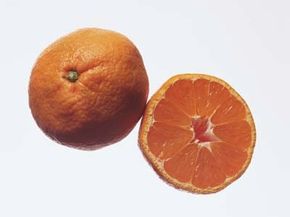Hemorrhoids are swollen and stretched-out veins that line the anal canal and lower rectum. Internal hemorrhoids may either bulge into the anal canal or protrude out through the anus, in which case they are called "prolapsed." External hemorrhoids occur under the surface of the skin at the anal opening. Regardless of type, hemorrhoids cause cruel distress: They hurt, burn, itch, irritate the anal area, and, very often, bleed.
About one-half to three-fourths of all Americans will develop hemorrhoids at some time in their lives. There are a number of factors that contribute to them, some of which can be avoided.
Advertisement
- Gravity. Humans stand upright, which causes a downward pressure on all veins in the body, including those in the anal canal and rectum.
- Family history. If one parent has hemorrhoids, it is more likely that his or her child will develop them in adult life; if both parents have hemorrhoids, it is a near certainty.
- Age. While hemorrhoids usually begin to develop when an individual is 20 years old or even earlier, symptoms usually do not appear until the 30s and beyond.
- Constipation. Difficulty in passing fecal matter creates pressure and possible injury to veins in the anal canal and rectum.
- Low-fiber diet. Highly refined foods (white flour products, sugar, foods high in fat and protein and low in complex carbohydrate) result in a fiber-deficient diet, with resulting constipation and hemorrhoids.
- Obesity. Added pounds put more pressure on veins. What's more, overweight individuals may be more likely to favor refined foods and a sedentary lifestyle.
- Laxatives. Improper use of these products is a major cause of constipation and therefore likely plays a leading role in the development of hemorrhoids.
- Pregnancy. As the fetus grows, it puts additional pressure on the rectal area. Pregnancy-related hemorrhoids usually retract after the baby is born, unless they were present beforehand.
- Sexual practices. Anal intercourse also puts pressure on veins in the anal canal.
- Prolonged sitting. Without some form of regular exercise, the heart muscle is less efficient at returning blood from the veins to the heart.
- Prolonged standing. The pull of gravity continues unabated on the body's veins in individuals who are on their feet all day.
To learn about more home remedies for related ailments, visit these links:
- To see all of our home remedies and the conditions they treat, go to our main Home Remedies page.
- If your internal plumbing is all backed up, read Home Remedies for Constipation to find relief.
- Read Home Remedies for Weight Loss to find common foods that can actually help you stick to your diet and shed some pounds.
This information is solely for informational purposes. IT IS NOT INTENDED TO PROVIDE MEDICAL ADVICE. Neither the Editors of Consumer Guide (R), Publications International, Ltd., the author nor publisher take responsibility for any possible consequences from any treatment, procedure, exercise, dietary modification, action or application of medication which results from reading or following the information contained in this information. The publication of this information does not constitute the practice of medicine, and this information does not replace the advice of your physician or other health care provider. Before undertaking any course of treatment, the reader must seek the advice of their physician or other health care provider.
Advertisement

